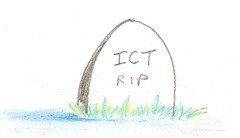Almost nobody needs a gasp of computer programming, and even fewer need to know how computers actually work.
Read MoreComputer programming and the trouble with collective nostalgia
 Lord Puttnam said something every interesting at an E-Learning Foundation Conference. Having been a film producer, he said that up to about ten years ago, to be a successful cinematographer you had to be able to take a camera apart and put it together. Now, none of those sort of skills are required: you need a whole different set of skills in order to find employment in that occupation.
Lord Puttnam said something every interesting at an E-Learning Foundation Conference. Having been a film producer, he said that up to about ten years ago, to be a successful cinematographer you had to be able to take a camera apart and put it together. Now, none of those sort of skills are required: you need a whole different set of skills in order to find employment in that occupation.
I believe a similar thing is true in the realm of “digital education”. Almost nobody needs a gasp of computer programming, and even fewer need to know how computers actually work.
Computer Science courses should be left to the experts: teachers
 It’s astonishing how everyone is an expert on school education these days. Everyone, that is, except the people who actually work in and with schools. The latest half-baked idea appeared in the BETT opening speech by Michael Gove, the Education Secretary for England & Wales. Here’s what he said:
It’s astonishing how everyone is an expert on school education these days. Everyone, that is, except the people who actually work in and with schools. The latest half-baked idea appeared in the BETT opening speech by Michael Gove, the Education Secretary for England & Wales. Here’s what he said:
Universities, businesses and others will have the opportunity to devise new courses and exams. In particular, we want to see universities and businesses create new high quality Computer Science GCSEs, and develop curricula encouraging schools to make use of the brilliant Computer Science content available on the web.
This is a dreadful idea for several reasons.
4 Reasons that the ICT Programme of Study “had” to go
 The fate of the ICT Programme of Study could have been predicted accurately long before Judge Gove donned his black cap and passed the death sentence. After several years of what might be justly described as a “war of attrition”, the weight of the “evidence”, such as it is, made such an outcome unavoidable.
The fate of the ICT Programme of Study could have been predicted accurately long before Judge Gove donned his black cap and passed the death sentence. After several years of what might be justly described as a “war of attrition”, the weight of the “evidence”, such as it is, made such an outcome unavoidable.
This article is not, to continue the analogy, meant to be the beginning of an appeal process
Digital literacy and Computer Science
 Computer studies and its main component, programming, could be an exciting new addition to the curriculum. However, we must not repeat the mistakes of the 1980s, when the subject was, at least in my experience and in my opinion, insular, highly technical, and rightly perceived by some (especially girls) as “geeky”.
Computer studies and its main component, programming, could be an exciting new addition to the curriculum. However, we must not repeat the mistakes of the 1980s, when the subject was, at least in my experience and in my opinion, insular, highly technical, and rightly perceived by some (especially girls) as “geeky”.Interview with Melendy Lovett
 I recently interviewed Melendy Lovett, President of Texas Instruments’ worldwide education technology business, about the state of STEM – Science, Technology, Engineering and Mathematics education. I put it to her that in the UK there are fewer and fewer people taking up Computer Science at university, because of the emphasis on 21st century skills and ICT, ie the study of how to use programs rather than how to create them in the first place.
I recently interviewed Melendy Lovett, President of Texas Instruments’ worldwide education technology business, about the state of STEM – Science, Technology, Engineering and Mathematics education. I put it to her that in the UK there are fewer and fewer people taking up Computer Science at university, because of the emphasis on 21st century skills and ICT, ie the study of how to use programs rather than how to create them in the first place.